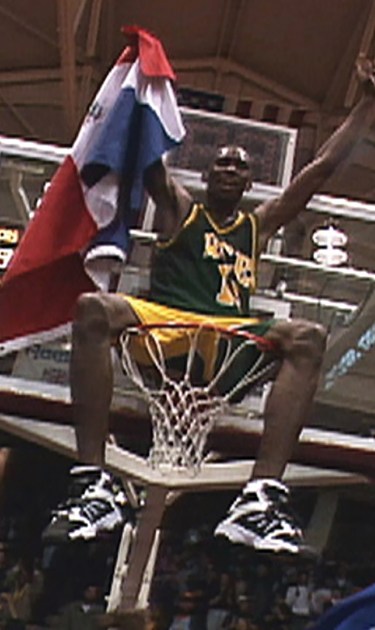For die-hard basketball fans — and many Dominicans, surely — the name Felipe López immediately conjures up memories from the 90s, when the young Bronx kid from DR was hailed as “the Dominican Michael Jordan.” López, who in 1994 — the year he graduated high school! — was on the cover of Sports Illustrated, had a one-way ticket to glory, an assured spot not just in the NBA but in many halls of fame to come. His athletic prowess on basketball courts all over New York City was legendary, earning him a write-up in the New Yorker by none other than Susan Orlean, and nabbing him offers from colleges from all over the country. If he’d wanted to, he could have gone straight to the NBA. That’s how good he was. The fact that “López” never became as famous a name as Jordan, Johnson, LeBron, or Bryant is precisely what drives a new documentary titled The Dominican Dream.
Director Jonathan Hock gives López, his family, his coaches and teammates — and even fans from back in the day like A-Rod! — the chance to recount how young Felipe first dazzled an entire community in the late 80s and early 90s. And, as its title suggests, this is an immigrant story: the López family first moved from the Dominican Republic to the Bronx in the 80s, in the hopes of offering their kids a better future. Sadly, Felipe and his sister were first denied visas, and so had to spend a couple of years away from their family. When they arrived in the Bronx, then a borough all but synonymous with drugs and violence, their older brother suggested Felipe join a local basketball league. The rest, as they say, is history. As archival footage from high school and city league games shows, the six foot five player was a force to be reckoned with.
Indeed, while the intimate on-screen interviews are wonderfully candid, the real joy of The Dominican Dream is seeing all those grainy, videotaped games that give but a glimpse into how great of a player López was. Despite showcasing games that were played decades ago, Hock’s direction and editing make you feel like you’re watching a sports film. You keep finding yourself at the edge of your seat waiting to see if that slow-mo ball will make it into the hoop or not, whether he’ll make history or find himself suffering yet another loss. More importantly, though, is that those archival shots capture just how much López galvanized the Dominican community. There were flags and screams at his games, yes, but these were people who also came to the games with plátanos at the ready to cheer on their new local hero.
As the doc starts to trace what happened when López played for St. John’s (only playing one NCAA game) and later for a number of teams in the NBA (after fearing he wouldn’t be drafted at all), you see firsthand why you may not have heard about him until now. His games, which again dominate much of the doc’s running time, show a player struggling, perhaps feeling the weight of all that was expected of him. He was, after all, a first generation college kid who’d barely been in the United States for a decade when he found himself staring at the prospect of a future as a professional basketball player. There’s bittersweetness to his narrative, yet Hock doesn’t dwell on questions of failure or missed opportunities. Instead, he stresses how much of a role model López became and how he’s since built a comfortable life for himself with a basketball league in his own hometown.
López’s story is, on the one hand, a cautionary tale about hype, and on the other hand, a fascinating deconstruction of how we assess success. He may not have become the legendary player he was once ordained to be, but his story so defied odds that it’s hard to call him anything but an unqualified success. Here was a young, dark-skinned boy of fourteen living in a community ravaged by drugs and violence who couldn’t speak a word of English. Not only did he master the language and put himself through college, helping his family in turn, but he became a role model for an entire nation. To see him, in the final moments of the documentary, gleefully driving through his old neighborhood giving out Christmas presents, foodstuffs and basketballs, you can see in his smile the joy of self-satisfaction. He’s exactly where he wants and chooses to be, having achieved a dream that only the United States could’ve offered him but which could only come true in his home country.
The Dominican Dream screened as part of the 2019 Tribeca Film Festival.




